May 02, 2024
IRIS Representative Chris George Discusses Refugee Crisis and Resettlement
Chris George, the former Executive Director of Integrated Refugee and Immigrant Services (IRIS), spoke at KO and offered students an honest glimpse into the world of refugee resettlement. Sponsored by the Christopher Conrad Class of ’91 Fund for Social Justice, George’s visit painted a raw and touching picture of the realities of what refugees face when they come to America, including doing a real-life scenario roleplaying of the process using student volunteers. A seasoned professional for more than three decades in refugee services, George has had boots on the ground in some of the most vulnerable refugee areas of the world and dispelled some of the myths about the reality of application and resettlement.
IRIS is a non-profit agency whose mission is to help refugees and other displaced people establish new lives, strengthen hope, and contribute to the vitality of Connecticut’s communities. The agency welcomes persecuted people from different countries and provides essential support during their transition to life in the United States.
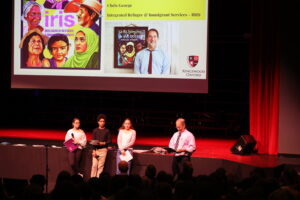
During his tenure at IRIS, George was pivotal in helping to transform the organization into Connecticut’s premier refugee resettlement agency. Under his leadership, thousands of refugees and immigrants were welcomed to this country, and he fostered integral community partnerships that assisted those starting with nothing when they arrived.
George’s journey into humanitarian work began in 1977 when he joined the Peace Corps and was placed in Muscat, Oman. This experience would ignite a lifelong dedication to serving refugees, eventually leading him to the forefront of refugee advocacy in IRIS. George remained in the Middle East for over a decade. While he recounted a host of vivid memories from his time in the refugee camps, including rows and rows of thousands of tents, the sickening smell of raw sewage running down the streets, and the despair of people’s faces who had lost so much, George said there was something different for him that stood out above all of these heartwrenching things.
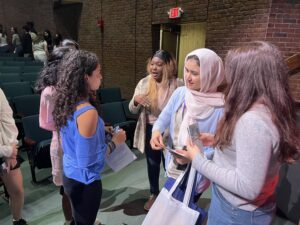
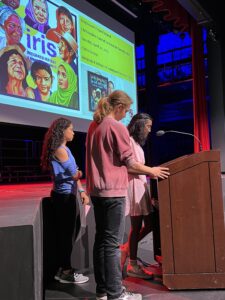
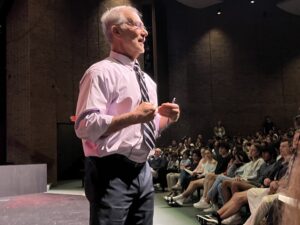
“My most powerful and profound memory of visiting refugee camps, what I remember most, was the amazing hospitality that refugees showed me,” he said. “They knew I came from the wealthiest, most powerful country on earth. But when I visited, the most important thing to them was to show me hospitality. They put on a pot of water and some coffee or tea. They would rustle up the last bit of food to serve it. They would grab what little money they had and send their oldest son down the street to buy a package of cookies to serve. They gave me a lesson in hospitality and generosity that I have never forgotten.”
This generosity of those who had lost everything yet still found it in their hearts to offer what little they had to a stranger from far away has impacted George every day since.
For the next hour, using audience members as volunteers to play a real Syrian refugee family of Abdullah, Fatima, and Salwa, George showed a typical vetting process for a refugee family trying to come to the United States. The story recounted how drastically life changed for the family when Abdullah’s bakery was bombed, as was Fatima’s university, an attack that four-year-old Salwa witnessed three of her friends being killed. After the army threatened the family if they were not able to locate Fatima’s brother to join their cause, the family fled to the Zotery refugee camp, a large camp on the border of Syria.
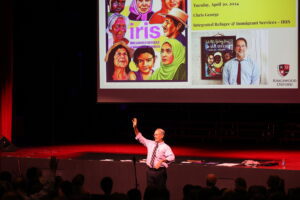
Their story involved countless interviews, hundreds of highly personal questions, background checks, fingerprinting, more interviews, and identification of family, friends, colleagues, co-workers, and distant acquaintances. George explained the process often takes two to four years. The crux of his real-time scenario lay in dispelling misconceptions surrounding refugees and highlighting the rigorous vetting process they undergo before resettlement in the United States.
With over 35 million individuals forced to flee their homes due to persecution, only a fraction of these individuals are granted the opportunity to rebuild their lives in welcoming countries like the United States. Through his work, George aids in the welcoming and onboarding of refugees once they get to America. He spoke beyond advocacy to practical assistance of the challenges faced by refugees in navigating unfamiliar systems, from finding housing and employment to overcoming language barriers. He explained the difficulties like talking to landlords, who often oppose the idea of refugees being tenants in their properties. He emphasized the urgency of compassion and understanding in their journey to safety by organizations such as IRIS.
He also shed light on the resilience and potential of refugees, many of whom are highly educated professionals forced to take on menial jobs upon arrival in the United States. Despite the obstacles they face, he has watched countless refugees he had a hand in acclimating to the United States work their way up in the workforce and become leaders in their community.
He left the audience with the powerful message that welcoming refugees is not just a legal obligation but a moral imperative rooted in history, as refugees and immigrants were the underpinnings of our country. He noted the symbolism of the Statue of Liberty as a beacon of hope and inclusion. “The Statue of Liberty is the symbol of this great tradition,” he said. “And as far as I know, the Statue of Liberty still stands and will stand for that great message we project to the world. This country will always welcome refugees.”
